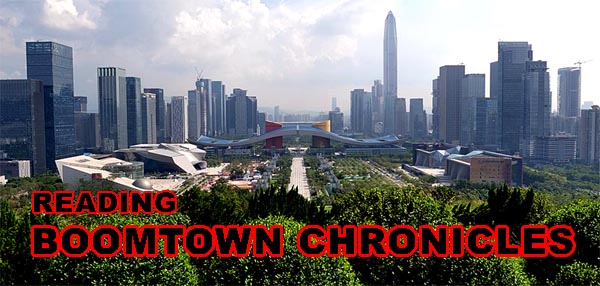 |
| Shenzhen, the Boomtown (Wikipedia) |
Note: Between Lesson #01-128 and #01-208, I wrote 72 lessons explaining expressions in articles published in the Shenzhen Daily. Read more about "Reading Boomtown Chronicles."
Get Ready: Do you own any stocks or bonds? Did you buy them yourself, or were they given to you? If you don't have any, have you ever thought about getting some?
Boomtown Chronicles Part XXV - published Monday, December 29, 2008
- "Treasury bonds" were first traded by a company called "Shenzhen Special Economic Zone Securities."
treasury bond: a bond issued by the treasury department of a government, in this case, China. They are also called "T-bonds."
We often hear the expression "stocks and bonds"; but how does a bond differ from a stock?
They are both forms of securities. But a stockholder is actually a part-owner of the issuing company; a person holding bonds has simply made a loan to the bond issuer.
So a bond is a promise to repay a debt, usually with interest. This makes it more of a "sure thing" than a stock, which may go up or down in value. On the other hand, bonds are "slow but steady"; they are stable and secure, but not a good way to "get rich quick."
--------
- "listed on the bourse"
bourse: a synonym for "stock exchange." It seems the term was first applied to the Paris stock exchange, where French merchants gathered to trade stocks. Apparently, the house where merchants had gathered in Bruges, Belgium, had a sign out front in the form of a purse or moneybag. "Bourse," then, is a French form of the English word "purse."
--------
We'll wrap up today with an interesting juxtaposition (placement of two things side by side) in the article.
- "Ping An employees were required to pedal through residential areas to sell insurance in the way that peddlers sold vegetables."
pedal: to propel a bicycle or other vehicle forward by pushing on its pedals (foot rests). ped- is, in this case, a root meaning "foot."
peddlers: people who travel around selling things. Here, ped is an old word meaning "basket," since peddlers would carry their goods around in baskets.
It is not related to the word "pedal." "To peddle" is a verb meaning "to sell in the manner of a peddler." ("Peddler" came first, so "peddle" is what we call a "back formation.") So now we have "pedal" and "peddle," two identical-sounding words with no connection.
No wonder English is so hard to learn!
--------Read more: https://en.wikipedia.org/wiki/Shenzhen
Practice: Choose the correct term to fill in the blank in the sentence below:
- bonds
- pedal
- peddlers
- stocks
- treasury bonds
- When Neil came to the hill, he had to ________ his bike as hard as he could to reach to the top.
- Corporate ________ can make you more money than treasury bonds, but less than stocks.
- My wife often buys vegetables from the ________ that pass our gate.
- Carla was a cautious investor, putting her money only in ________ backed by the government.
- Although they're a bit riskier, ________ can make you more money in a shorter time than bonds.
Answers are in the first comment below.
Submitted to the Shenzhen Daily for January 5, 2009


Answers to the Practice: 1. b; 2. a; 3. c; 4. e; 5. d
ReplyDelete